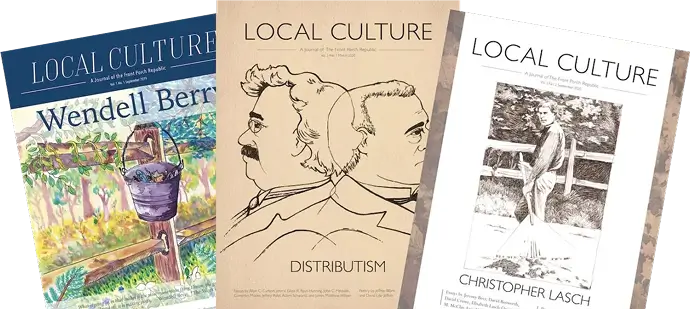The Editors
Articles by The Editors
Agrarianism Across the Pond: A Review of Richard Hawking’s At the Field’s Edge
For readers in North America, familiar as most of us are with the history our own agrarian tradition as well as our own “seismic shift in agriculture” from the work…
In Defense of Okra
I doubt okra tops many people’s list of garden must-haves, which is a shame since it is such a determined grower. Gardens are only guaranteed to produce one thing year…
John Deere and the Ox-Cart Man
How might we recognize and adopt a vision for the future of agriculture inspired by the beauty and goodness of the ox-cart man?
Building Institutions in an Age of Platforms and Hashtags
When institutions can’t serve their social function, our social problems are harder to address. And a society that cannot adequately respond to its problems is not a society that is…
Exile as Resettlement: A Review of The Best Poems of Jane Kenyon
Jane Kenyon was foremost a poet of place. Not of the State of New Hampshire, though she was its Poet Laureate, but of the much smaller and less abstract corner…
Left (not Liberal) Conservatism (or Communitarianism, if you Prefer): A Restatement
[Cross-posted to In Medias Res] Recently, Tablet Magazine published a lengthy essay by Eric Kaufmann, heralding the revival of "left-conservative" thinking, which the author defined as "a conservative view on…
The Domestic Arts: Finding a Quiet Dignity in the Mundane
As Sarah Orne Jewett knew, "everyday tasks” and the celebrations they engender are the condition upon which many other arts rest, including poetry.
Calling For A 21st-Century Magna Carta: A Review of Joel Kotkin’s The Coming Neo-Feudalism
The global middle class of Kotkin’s subtitle must unite with the working class for a new Magna Carta for the 21st Century, one that will, in Lincoln’s words, make us…
Protestants and Western Civ.
Hillsdale, Michigan. Which is more surprising? To read that a Great Booksy curriculum—which you, a fairly committed Protestant who tries to keep faith under wraps, happen to teach in—turns Protestants…
Better to Have Loved and Lost: A Review of Peter Wohlleben’s The Inner Life of Animals
If I can value the inner lives and the outer well-being of animals and plants and rocks and stars, because I can see the inherent beauty and goodness that something…
Work and Prayer: The Brief Friendship of Thomas Merton and Wendell Berry
Berry wrote in one of his letters to Merton that “you are one of the few whose awareness of what I’m doing here would be of value to me.” He…
For the Hog Killing, 1979 and the Work of Photography
Perhaps the appealing vision of neighborliness that For the Hog Killing, 1979 presents, and the image of agricultural community that it provides, can challenge those of us who are encouraged…
Tanya Berry’s Faithful Art
Women like Tanya bring artistry and honor to everything they touch: the homes they inhabit, the land they steward, the children they raise. These photographs are testimony to the clear,…
The Danger of Hope: Lana Del Rey, Stephen King, and Wendell Berry in the Days of COVID-19
Lana Del Rey. Wendell Berry. Stephen King. Singer-songwriter. Poet-novelist-essayist farmer. Horror writer. What brings these three seemingly disparate artists together in my imagination? Hope.
Teddy Roosevelt’s Prophetic Speech: The Perpetual Relevance of “The Man in the Arena”
Roosevelt delivered an oration he entitled “Citizenship in a Republic,” but which the world would soon come to call “The Man in the Arena.” Every fresh reading of the speech…
Justice Caleb Stegall, Localist and Classical Liberal (Sometimes)
Caleb Stegall was one of the early guiding lights of Front Porch Republic, and his influence on the project, however distant, still endures. I've enjoyed, and learned much from, my…
Coming to Ourselves in 2020
Of course, Amash may well not win, but that really is not the point. The prodigal son had limited hopes when he said goodbye to the pigs, but he had…
Reading the Bourgeois Mind with Léon Bloy
Léon Bloy delivers satires that aim to liberate souls from cages they did not even know they occupied.
On Flannery O’Connor and Jack Black
Maybe O’Connor’s narrative can teach us that people—and the places they call home, the places that form them—need not be defined by their flaws.
Walking in the Suburbs
Flânerie is a kind of silent revolt. The chief virtue in an industrial society is efficiency, but by its very nature, flânerie is inefficient. It doesn’t even pretend to care…
They Stood On Their Feet
The poetry in this book captures some of those everyday moments and holds them up in a light that makes possible another kind of clarity, not that of simply worded…
In Our Memory Lock’d: Memorial Day and the Need to Remember
One of the arts of statesmanship is the use of language, of rhetoric, to reshape the architecture of people’s souls and orient them towards political truths.
Tending to One’s Garden
Two lives, well-lived, in environments well and lovingly (dis)ordered. In the end, whether it be Monty Don walking through his gardens, or the late Umberto Eco walking past his shelves…
Thinking about the Post-Pandemic (and, Maybe, the Post-Suburban) Neighborhood
Chuck Marohn's work, whatever disagreements one may have with it, gives us some good counsel on where to start changing suburban-addicted minds and fiscal incentives.




















